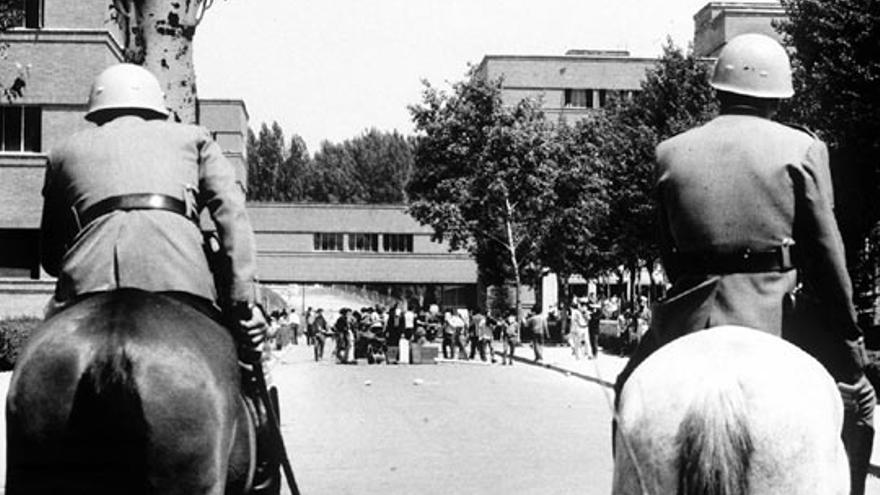
![]() 14ymedio, Rosa Pascual, Madrid, 13 April 2019 — Unlike in Cuba, the images of police officers beating unarmed students in Spain are gray. And called by the color of the uniform, the “Grays” were the members of the body responsible for order in Franco’s Spain. And the photographs from that era, the last years of the 1960s, are also gray, with their caption, “Running from the Grays,” imprinted in the vocabulary of generations of Spaniards in the present and the future.
14ymedio, Rosa Pascual, Madrid, 13 April 2019 — Unlike in Cuba, the images of police officers beating unarmed students in Spain are gray. And called by the color of the uniform, the “Grays” were the members of the body responsible for order in Franco’s Spain. And the photographs from that era, the last years of the 1960s, are also gray, with their caption, “Running from the Grays,” imprinted in the vocabulary of generations of Spaniards in the present and the future.
The anti-Franco student movement swelled in those years in the Spanish universities and the Grays came, usually on horseback, to break up with blows of their truncheons those crowds of wayward young who rose against the regime. For this reason, one of the main achievements of democracy in Spain was the recovery of university autonomy, enshrined as a fundamental right in Article 27 of the 1978 Constitution.
University autonomy is at the very origin of the institution. In the eleventh century, the Emperor Federico Barbarroja granted shelter and protection to the University of Bologna (the first in history) against the Government. Since then, it has been considered one of the most powerful mechanisms with which to protect Higher Education from political fluctuations and external interference, endowing the institution with its own governing and administrative bodies that protect its independence and freedom.
The context in which this concept must be placed is that of an institution that is constituted from its beginnings as a center of ideas, where intellectual restlessness, critical thinking and the exchange of opinions are part of its nature and favor an environment more prone to the questioning of authority as a given.
It is, therefore, natural that university autonomy is intrinsic to democracy. Or, in other words, incompatible with the dictatorship.
One of the most controversial aspects of university autonomy, even in consolidated democracies, is the inviolability of the campus. This implies the assumption that the Police Forces and State Security Forces can not enter the campus unless expressly authorized by the highest authority, the rector.
During the Transition to Democracy in Spain, the pitched battles between Franco’s police and the student movements were very recent. It counted for something that some of the politicians who sat in the first Courts of democracy had been colleagues or teachers of Enrique Ruano, an iconic student leftist who died in strange circumstances (they claimed he fell out of a window) during an arrest for distributing labor union leaflets.
The newly born Spanish democracy struggled for decades to keep the police as remote as possible from the universities. The protests inside the campuses, which in the worst case involved some graffiti or vandalism, were allowed to wind down or resolved or by negotiation between the student bodies and the rector. The security guards seldom dealt with demonstrations or disorder and, in no case, did they carry firearms.
On a few occasions the police have intervened on a Spanish campus in democracy. A judgment of the Supreme Court of 2003 guarantees that the entry of agents into the premises does not in itself violate the right to university autonomy and affirms that the institution lacks independence with regards to citizen security or the right to assembly or demonstration.
However, rarely has there been a political, academic or police authority that wants to be the one who allows the riot police to dissolve a protest with blows, which would involve to their name in the slightest shadow of the memory of the Franco regime’s police. This presence not only implies the inability to resolve conflicts in a dialogued manner, but it also violates some of the fundamental pillars of democracy and the fundamental rights of citizens.
The image of an agent of the National Revolutionary Police pointing a gun at an unarmed Congolese student, no matter how enraged the protest, should be intolerable in a country that, although we know it is not a democracy, does claim to defend the rights human beings in every international forum.
With a new democratic Constitution, which will not be the same as yesterdays, the photos of police hitting students in Cuba will continue to be in color, but very likely they will go down in history.
________________
The 14ymedio team is committed to serious journalism that reflects the reality of deep Cuba. Thank you for joining us on this long road. We invite you to continue supporting us, but this time by becoming a member of 14ymedio. Together we can continue to transform journalism in Cuba.
